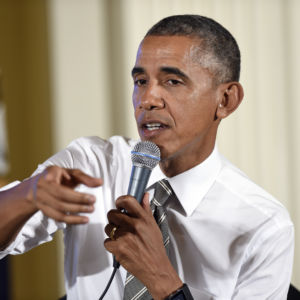Barack Obama has said he will stay out of his party’s battle to select a presidential nominee, but the administration’s proposed budget released Tuesday sends an unambiguous message about where the president thinks Democrats’ future lies: To the left.
Obama’s proposed $4.1 trillion budget for fiscal year 2017, his administration’s eighth and final spending plan, was pronounced dead-on-arrival in the Republican-controlled Congress, which is likely to spend the rest of the year wrangling over spending. But even if it’s irrelevant on Capitol Hill, the annual fiscal blueprint from the White House gives the president an opportunity to burnish his progressive credentials in a party that is seriously considering a self-proclaimed socialist as its standard-bearer.
Among the liberal markers Obama puts down in his budget, the most ambitious is his call for a $10 fee on every barrel of crude oil. With gas prices below $2 a gallon in some regions, the president said last week that now is the time for the proposed new tax, which would cost consumers an extra 20 to 25 cents per gallon.
“Some of that revenue can be used for transportation, some of that revenue can be used for the investments in basic research and technology that’s going to be needed for the energy sources of the future,” Obama said last week. “Then 10 years from now, 15 years from now, 20 years from now, we’re going to be in a much stronger position when oil starts getting tight again, prices start going up again. We’ll look back and we’ll say, that was a smart investment, that was a wise decision for us to make.”
The proposal, coming on the heels of the administration’s ruling against the proposed Keystone Pipeline XL, has been cheered by the president’s environmentalist allies, but Democrats who potentially face voters next fall – including presidential contenders Bernie Sanders and Hillary Clinton — have been relatively quiet.
American Petroleum Institute President Jack Gerard criticized the proposal Tuesday as the latest evidence of Obama’s “leave-it-in-the-ground” approach to fossil fuels.
“No longer constrained by electoral considerations, the administration has shifted from a balanced all-of-the-above strategy on energy to an extreme policy objective: to choke off America’s energy renaissance and keep fossil fuels in the ground at the expense of consumers,” he said. “Only extremists whose goals ignore the concerns of consumers and lower-income families could welcome the administration’s backward approach.”
Rep. Kevin Brady, a Houston Republican and chairman of the Ways and Means Committee, which would have to sign off on the oil tax as well as the other new taxes — $2.6 trillion over the coming decade — sought in the Obama budget, said the proposal “is clearly about promoting his liberal legacy instead of securing America’s financial future.”
Republican leaders, echoing Brady, took the unusual step of announcing the president’s budget won’t even be given hearings.
“Rather than spend time on a proposal that, if anything like this Administration’s previous budgets, will double down on the same failed policies that have led to the worst economic recovery in modern times, Congress should continue our work on building a budget that balances and that will foster a healthy economy,” House Budget Committee Chairman Tom Price, R-Ga., said in a GOP statement.
“President Obama will leave office having never proposed a budget that balances — ever. This isn’t even a budget so much as it is a progressive manual for growing the federal government at the expense of hardworking Americans,” said House Speaker Paul Ryan, R-Wis.
But the president’s budget earned praise from activists across the Democratic spectrum, including the Sierra Club and others in the green movement backing the budget’s call for more clean energy funding and advocates for the homeless cheering the president’s call for $11 billion to address housing needs.
“Exactly what [communities] need to end homelessness for families with children, once and for all,” said Nan Roman, president of the National Alliance to End Homelessness.
Other highlights from the president’s budget include:
• Tax increases on the wealthy and on corporations to fund proposed expansions of Medicare
• $4 billion to promote computer science in public schools
• A “moonshot” initiative to cure cancer
• An increase in funding for Pell Grants for low-income college students
• New incentives to encourage investments in individual retirement accounts
• $19 billion for cyber-security spending.

